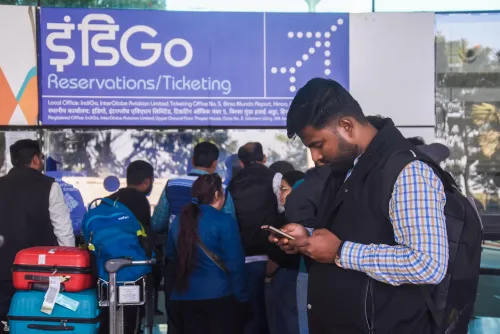Government Allocates ₹2.23 Lakh Crore for 1,206 Direct Benefit Transfer Initiatives

New Delhi, Dec 27 (NationPress) The Finance Ministry’s Department of Expenditure (DoE) has facilitated the real-time and transparent allocation of funds for 1,206 schemes under the Direct Benefit Transfer (DBT) program for the fiscal year 2024-25, processing an unprecedented ₹2.23 lakh crore, as outlined in a year-end report published on Friday.
According to the review, "This initiative has bolstered the Digital India mission through extensive integrations with 117 external systems and seamless interfaces with major banks, significantly improving efficiency and accountability."
The framework allows for complete monitoring of funds from their initial release to the crediting into the bank accounts of the intended beneficiaries, effectively minimizing leakages.
In line with the recommendations from the 15th Finance Commission, the DoE has also enhanced state finances by providing additional borrowing capabilities, performance-linked incentives, and grants for disaster recovery, healthcare, and regional development.
For the fiscal year 2024-25, the net borrowing limit was established at ₹9.40 lakh crore, with an extra 0.5 percent of Gross State Domestic Product (GSDP) earmarked for reforms in the power sector. These initiatives aim to enhance operational efficiency and foster economic sustainability across states, as observed in the report.
Public procurement reforms are a major focus, featuring increased financial thresholds under the General Financial Rules (GFRs) and the introduction of a revised Procurement Manual in 2024. These updates emphasize Ease of Doing Business, transparency, and clarity in procurement processes, ensuring compliance with modern governance standards. The delegation of Financial Powers Rules, 2024 further streamlines decision-making by empowering departments and individuals, enhancing efficiency and responsibility in financial management, as noted in the report.
The DoE has also rolled out social security reforms for government employees through the Unified Pension Scheme (UPS), which guarantees assured pensions and inflation-adjusted benefits for retired personnel.
Set to launch on April 1, 2025, the scheme underscores the government’s commitment to ensuring the welfare of its workforce. Concurrently, disaster management initiatives have included the prompt allocation of funds to states impacted by floods and landslides, alongside the modernization of fire and emergency services.
These accomplishments align with the vision to uphold fiscal prudence, operational efficiency, and inclusive development. By integrating digital technologies, empowering financial autonomy, and addressing essential needs such as disaster recovery and social security, the DoE continues to enhance governance and promote economic resilience through support for capital investment, the report concluded.










